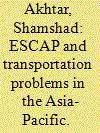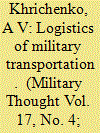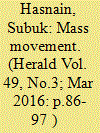| Srl | Item |
| 1 |
ID:
152673


|
|
|
|
|
| Summary/Abstract |
International Affairs: Dr. Akhtar, the United Nations Economic and Social Commission for Asia and the Pacific (ESCAP) deals with a wide range of problems, but since the purpose of your visit to Moscow is to participate in the third session of the Ministerial Conference on Transport, it would be natural if we started by talking about transport. What effect does the process of unification of the transport networks of Asia-Pacific countries have on trade in the region and on economic and other ties in it?
|
|
|
|
|
|
|
|
|
|
|
|
|
|
|
|
| 2 |
ID:
085220


|
|
|
| 3 |
ID:
145333


|
|
|
| 4 |
ID:
138989


|
|
|
|
|
| Summary/Abstract |
This article analyses the political economy of the Bus Rapid Transit project implemented in Dar es Salaam between 2002 and 2014. It discusses the recent rapid growth of Bus Rapid Transit systems and the vested interests of the actors promoting them as a “win-win” solution to tackle the crisis of public transport in developing countries. The article discredits such “win-win” narratives by showing what some Tanzanian actors stood to lose from the implementation of the Dar es Salaam Rapid Transit scheme and their capacity to resist the project. It analyses tensions over the inclusion of the current public transport workforce, employment destruction, displacement of current paratransit operators, compensation, and the affordability of the new service. The article argues that slow implementation of the transport system was rooted in the tepid commitment to the project by the Tanzanian government. In turn, this lack of political will can be explained by domestic politics, and in particular the government’s attempt to respond to the priorities of the World Bank without alienating local actors, some of whom wield considerable electoral power.
|
|
|
|
|
|
|
|
|
|
|
|
|
|
|
|
| 5 |
ID:
132649


|
|
|
|
|
| Publication |
2014.
|
| Summary/Abstract |
This paper develops a system dynamics model of Iceland×s energy sector (UniSyD_IS) that is based on the UniSyD_NZ model of New Zealand×s energy economy. The model focuses on the energy supply sector with endogenous representation of road transport energy demand. Equilibrium interactions are performed across electricity, hydrogen, biofuels, and road transport sectors. Possible transition paths toward a low-carbon transport in Iceland are explored with implications for fuel demand, greenhouse gas (GHG) emissions and associated costs. The consumer sector simulates the long-term evolution of light and heavy-duty vehicles through a vehicle choice algorithm that accounts for social influences and consumer preferences. Through different scenarios, the influences of four fundamental driving factors are examined. The factors are oil price, carbon tax, fuel supply-push, and government incentives. The results show that changes in travel demand, vehicle technologies, fuel types, and efficiency improvements can support feasible transition paths to achieve sufficient reduction in GHG for both 4 °C and 2 °C climate scenarios of the Nordic Energy Technology Perspectives study. Initial investment in supply infrastructure for alternative fuels will not only mitigate GHG emissions, but also could provide long-term economic benefits through fuel cost saving for consumers and reduced fuel import costs for government
|
|
|
|
|
|
|
|
|
|
|
|
|
|
|
|
| 6 |
ID:
189289


|
|
|
|
|
| Summary/Abstract |
This paper analyzes the trends of key components of transport services at the national and regional levels. It shows that, despite the adverse effect of restrictions during the 2019-2020 pandemic, Russian transport services exports are increasing thanks to growing revenues from cargo operations. A regional cross-section is taken on the basis of Russia's Far East. At the macroregional level, the share of services exports is far greater (80% higher) than the Russian national average. The major contributor to the macroregional index is Primorye Territory (7.5%), home to key seaports on the Pacific coast.
|
|
|
|
|
|
|
|
|
|
|
|
|
|
|
|
| 7 |
ID:
133216


|
|
|
|
|
| Publication |
2014.
|
| Summary/Abstract |
According to the Asian Development Bank (ADP), the sheer dearth of a developed transport framework, coupled with an ever-persistent law and order problem has rendered Karachi one of the world's most 'unlivable' cities. The reality is that apart from the dearth of a healthy transport system and an abysmal law and order situation, Karachiites have to deal with the criminal rules of the existing transport game controlled by the city's transport mafia.
|
|
|
|
|
|
|
|
|
|
|
|
|
|
|
|